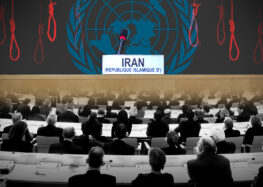Telegram App Submits to Russian Registration Requirement. Will it Do the Same in Iran?

The announcement by the CEO of the Telegram messaging application that he has agreed to register his firm in Russia has raised concerns about whether he will do the same in Iran, where the app is widely used.
“Our hope is that Telegram will resist against pressure from Iranian authorities and not store our data inside Iran,” a political activist and Telegram user in Tehran, who asked not to be identified for security reasons, told the Center for Human Rights in Iran (CHRI).
We are not doing that.
— Pavel Durov (@durov) July 3, 2017
“Experience has shown us that the security forces are able to access data [from servers based] inside the country,” added the activist. “Therefore, if Telegram decides to come to Iran, we will definitely stop using it.”
The company’s founder and CEO, Russian entrepreneur Pavel Durov, took to Twitter in late June to state that Telegram would not share user data with the Russian government.
We've no issue with formalities, but not a single byte of private data will ever be shared with any government https://t.co/HZl5b4kWPt
— Pavel Durov (@durov) June 28, 2017
“We’ve no issue with formalities, but not a single byte of private data will ever be shared with any government,” he tweeted on June 28, 2017.
Durov’s tweet followed a report that had appeared earlier in the day in the New York Times where the Federal Service for Supervision Of Communications, Information Technology and Mass Media in Moscow said that Telegram had presented all the required data for registration in Russia.
Durov agreed to cooperate with the Russian authorities after they claimed terrorists had used the app to communicate during a suicide attack in St. Petersburg in April 2017 that left 15 people dead.
On June 26, Russia threatened to ban Telegram if it refused to comply with the country’s new data protection laws, which require “information distribution organizers” to register with the regulator and store user data in the country for six months, the BBC reported.
Registered companies in Russia must also provide their encryption keys to the authorities when asked, added the report. This would allow the owners of the keys to access any encrypted data.
“We will not carry out unconstitutional or unreasonable demands,” wrote Durov on his page on a Russian social media network on June 28. “Nor will we comply with laws that do not conform with our policies to protect our users’ private space and data secrecy.”
He continued: “As for Russian laws, we can only commit to the same degree of cooperation we have had with other countries. That is to say, we will continue to work together to remove content related to terrorism, drug-trafficking, violence, pornography and spam.”
Telegram in Iran
Durov stated in April 2017 on his official Telegram channel that more than 40 million people use the app in Iran. Iran’s state authorities have repeatedly demanded that Telegram install its servers handling domestic traffic in Tehran.
Storing Telegram’s servers in Iran would make it easier for the country’s security agencies to hack and monitor content and user accounts.
To date, Telegram has publicly refused to work with the Iranian authorities, and assured Iranian users that it will protect their data from the state.
However, Telegram’s agreement to register in Russia, where there are only six million users, has raised fears that the company will also eventually capitulate to pressure from Iranian state authorities to store its servers domestically.
In September 2015, Mohammad Hassan Entezari, the secretary of Iran’s Supreme Cyberspace Council, the country’s highest Internet policymaking body, claimed “30 percent of the data” from Telegram users was hosted inside Iran. However, Telegram quickly refuted the claim, stating that Entezari was “100 percent” wrong.
In January 2016, when Iran’s Telecommunications Minister Mahmoud Vaezi announced that Telegram had agreed to remove a list of channels provided by the state, Durov replied that the company would only delete “Any channel containing porn or ISIS content no matter who reports it at [email protected],” the company’s publicly available email for such reports.
@CDA @telegram @Ammir @Hassanvand Any channel containing porn or ISIS content is blocked no matter who reports it at [email protected]
— Pavel Durov (@durov) January 13, 2016
Six months ahead of Iran’s presidential and council elections on May 19, 2017, Iran’s Cyber Police (FATA) announced that Iranian-owned Telegram channels with more than 5,000 followers would be required to seek official permits issued by the government in December 2016.
In March 2017, several admins of reformist channels that support President Hassan Rouhani were arrested without charge. They had all previously registered their accounts according to the requirement.






